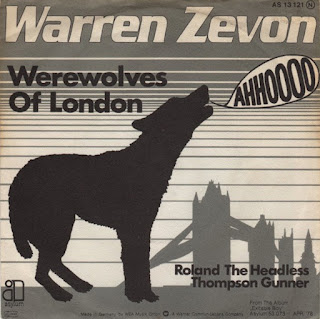WARREN ZEVON - WEREWOLVES OF LONDON
Released: January 18, 1978
Charted: US: #21
"Werewolves of London" is a song performed by American singer-songwriter Warren Zevon. It was composed by Zevon, LeRoy Marinell and Waddy Wachtel and was included on 1978 “Excitable Boy”, Zevon's third solo album. The track featured Fleetwood Mac's Mick Fleetwood and John McVie on drums and bass respectively. The single was released by Asylum Records and was a top 40 US hit, the only one of Zevon's career.
Zevon had this song written long before it was released in 1978. After putting out an album in 1970, he took work writing jingles and became The Everly Brothers' bandleader. His good friend Jackson Browne championed him and started performing "Werewolves Of London" in 1975, always explaining that the song was written by Zevon.
Browne convinced his label, Asylum, to sign Zevon, and they did, pairing them in the studio with Browne producing. They didn't record "Werewolves Of London" for Zevon's first Asylum album, “Warren Zevon”, in 1976, because Browne, already a savvy industry veteran with three albums under his belt, knew that Zevon's more outlandish songs like "The French Inhaler" and "Desperados Under The Eaves" wouldn't make it to their second Asylum album, so they had to record them while they had the chance. Meanwhile, Browne's label pushed him to record "Werewolves," but he refused, knowing it was quintessential Zevon. Browne returned to produce Zevon's next album, “Excitable Boy”, and this time they included "Werewolves Of London".
At its most basic level, the song recounts a werewolf roaming the streets of Soho in London, searching for a Chinese restaurant, Lee Ho Fook's, and eventually paying a visit to a woman's kitchen. The chorus simply warns the listener that they should beware of the werewolves of London. The song also alludes to Lon Chaney and Lon Chaney, Jr., two famous horror actors. The deeper meaning of the song is open to interpretation, some suggest it is a warning against the dangers of letting one's wild impulses take over, while others argue it is simply a tongue-in-cheek story about facing one’s fears. Ultimately, the song leaves it to the listener to come up with their own interpretations.







Cap comentari:
Publica un comentari a l'entrada